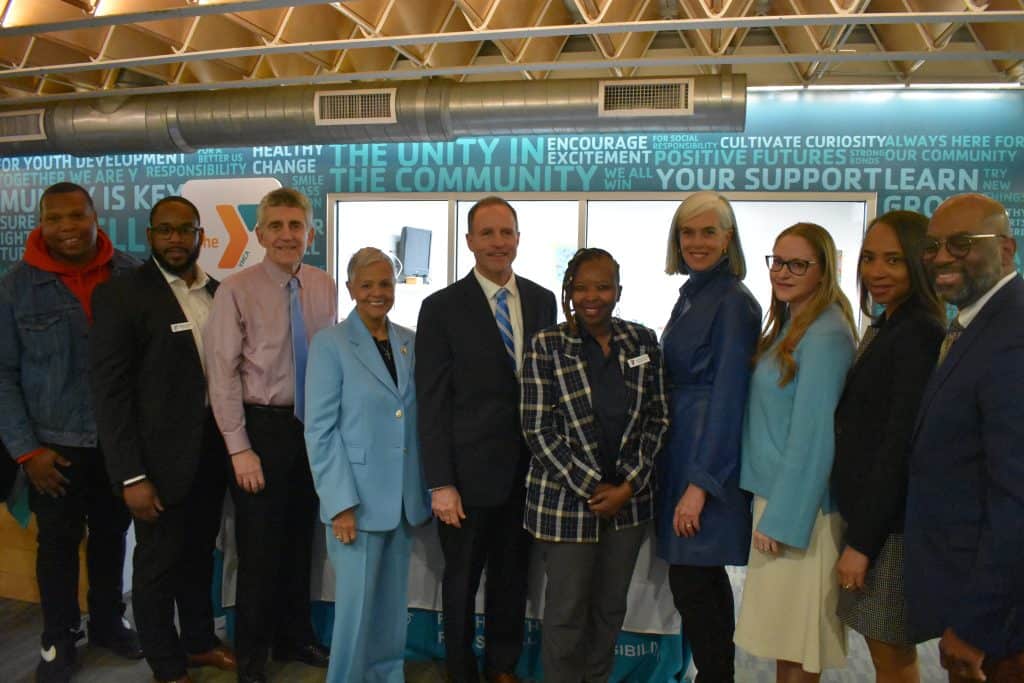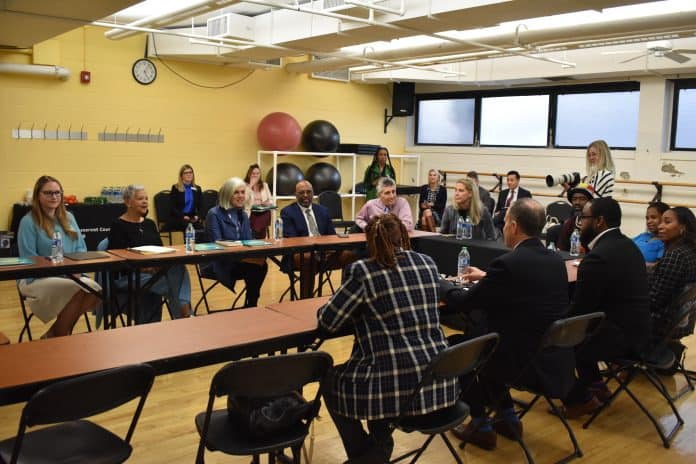
Democratic House Minority Whip Katherine Clark, U.S. representative from Massachusetts, and Rep. Bonnie Watson Coleman (D-12) met with YMCA providers, the New Jersey Department of Human Services (NJDHS), local families and officials on the need for federal funding to support child care providers and programs.
NJDHS Commissioner Sarah Adelman, representatives of Greater Somerset County YMCA, Capital Area YMCA, and Princeton YMCA, Mercer County officials and administration, a local family and local officials joined Clark and Watson Coleman in a roundtable listening session to discuss the needs for federal funding related to child care providers and workforce at the Princeton YMCA on Feb. 26.
“Child care and afterschool care not only builds healthy kids it builds healthy communities, and a healthy economy for our country,” Clark said.
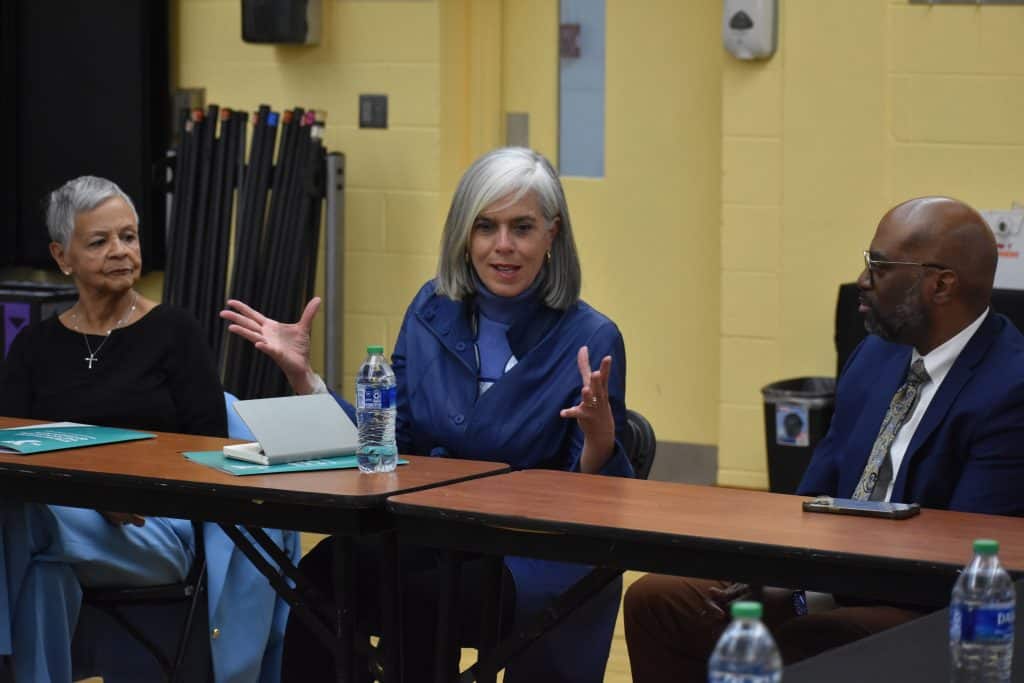
Democratic House Minority Whip Katherine Clark (MA-5) (center) speaks on child care with Rep. Bonnie Watson Coleman (left) and Mercer County Commissioner Sam Frisby (right) on Feb. 26.
The listening session addressed some issues facing child care providers, which includes expanding program eligibility and accessibility such as food service programs, finding qualified workers for the child care workforce, and increased funding for the state’s Child Care Development Block Grant.
“Some of the most important jobs in our community are the poorest paid jobs, whether it is care for the elderly or home health care or whether not it is child care,” Watson Coleman said. “We have to value the jobs that ensure our children have what they need and that our elderly get to live in dignity.”
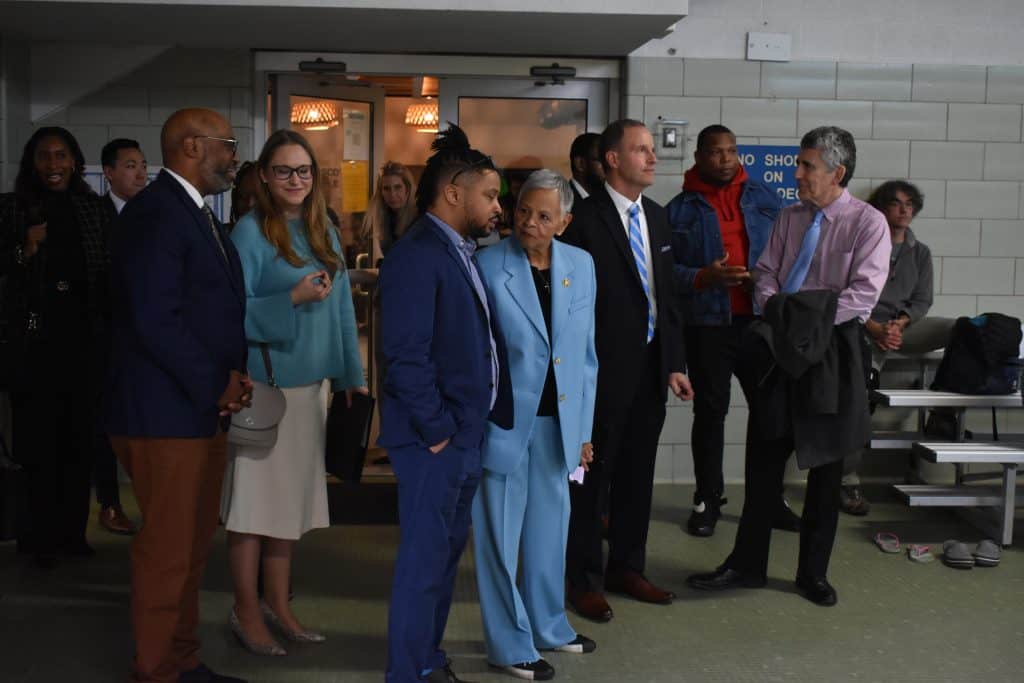
Rep. Bonnie Watson Coleman (D-12) tours the Princeton YMCA facility with YMCA leadership, local, county, and state cabinet officials.
Nyuma Cole and her husband Mohamed Bundu have lived in Princeton for two years and are in Princeton Community Village across from Hilltop Park. They are one of many families that have been able to utilize the benefits from the local YMCA programs and aftercare.
Cole, who has two children in YMCA programs, said the YMCA staff has been wonderful in keeping them updated on paperwork that needs to be submitted so they can qualify for programs that they are not aware of.
“My daughter goes to the afterschool program. She does homework there, they go to the park, they play, and get additional activities,” she said. “We are too busy working to be able to spend that time for those activities. By the time we get home we have to get things done to get ready for next day, so YMCA assists us in making sure homework is done.”
Louise McCants, CEO of Capital Area YMCA in Trenton, which serves Ewing and Lawrence, explained how nearly 80% of their afterschool recipients are currently subsidized.
“Now that the stabilization is going away some parents are shaking in their boots like what are we going to do,” she said. “Will we be able to afford it? Because they have to go to work. We have a lot of parents making that bare minimum.”
McCants is referring to the child care stabilization grants that were part of the American Rescue Plan Act (ARPA). Those grants had expired in September 2023 and provided financial relief to child care providers.
Coleman and Clark stressed that they are working on a bill, the Childcare Stabilization Act, in the U.S. House of Representatives to extend the funding that was part of the American Rescue Plan.
The bill sponsored by Clark and co-sponsored by Coleman would put $16 billion in mandatory funding each year back into the stabilization grants over five years.
“We filed the bill in advance of the cliff that came from that funding at the end of September, and we will continue to work with our colleagues across the aisle to make the case,” Clark said. “What I am hearing here and across the country is that families are going to lose services if we do not get this funding.”
If the Childcare Stabilization Act does not go through, Clark and Watson Coleman talked about the budget as a potential way to provide flexible federal funding to states on areas such as the workforce including YMCA organizations.
“It is still very difficult to find a qualified workforce of workers. The great thing about the Y is we train them,” McCants said.
“It is difficult to get them because child care is not easy and because of the pay level. The pay level is too low for what they want for their lives. Even at $18 an hour it is not enough to sustain a family in New Jersey.”
Watson Coleman said “we need to get through to January.”
“People need service, people need predictability, people need the capacity to raise their families and be safe and secure. They are not doing anything in Washington, D.C. in the House of Representatives to advance [what the people need],” she added.
“We are going to have to find money anyway and anywhere we can. We will rob Peter to pay Paul to make sure poor Paul does not get left out entirely.”
In the listening session, Mercer County Commissioner Sam Frisby, who is also director of Stategic Intervention with YMCA of the USA, expressed to Clark and Watson Coleman that two barriers they can help with are expanding the numbers of people eligible for subsidies and widening or at least minimizing the threshold on the food service program.
“What you have are parents who are just making it over the threshold, but when they made two dollars more so now, they are being pushed out of being able to get the subsidy that they need,” he said.
“What we found during the pandemic was many young people who needed food, but because you took away the barriers in allowing people to pick up food without having to come in contact with those things were critical to us moving from one point in time where we were serving I think 15,000 meals a month to 60,000 meals a month.”
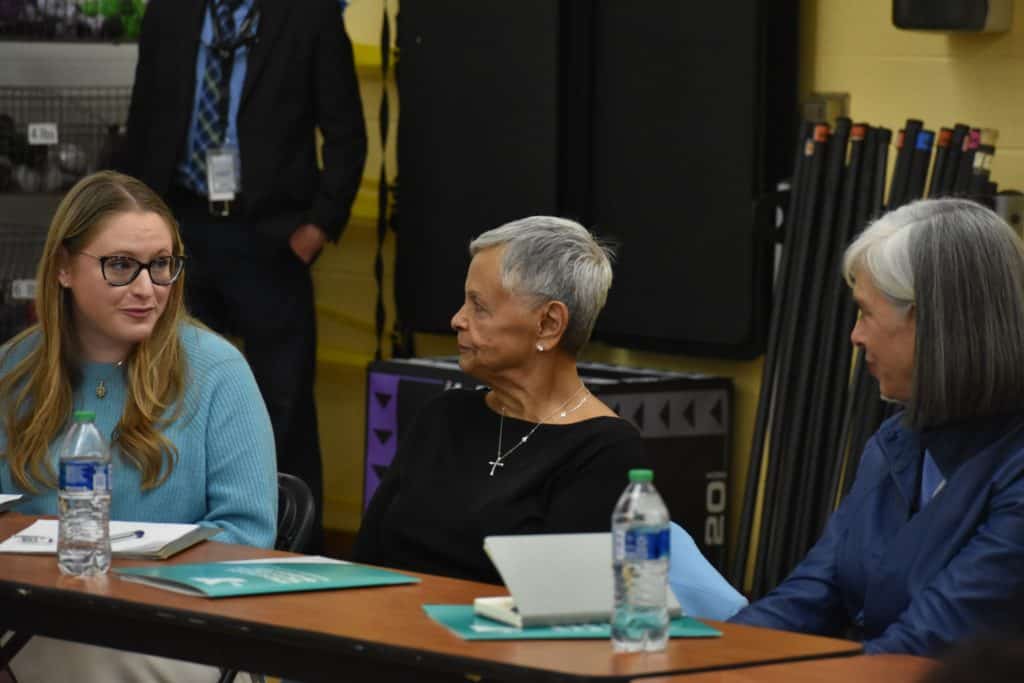
NJDHS Commissioner Sarah Adelman (left) relays what the state has done with funding for child care and need for increased funding for block grants to expand access.
David Carcieri, CEO of the Greater Somerset County YMCA, which has Princeton YMCA as a branch, shared that grant funding from Somerset County through the American Rescue Plan Act (ARPA) established Camp SOAR for under-resourced families.
“There were four communities where they were under-resourced,” he said. ” Children that qualified for free or reduced lunch were able to go to camp, provided transportation and meals and [for] many of the kids it was the first time they had been to a popular park – Colonial Park.”
Carcieri added that the two years of funding from federal dollars allowed Greater Somerset County YMCA to get CAMP SOAR up and running.
“Camp SOAR is going to be running this year as a self-sustainable camp,” he said. “The camp is being funded by other donors and foundational support plus folding in families that are able to pay for this camp.”
Keshon Bennett, branch executive director for Princeton YMCA, noted that the Princeton YMCA has a PYA (Princeton Young Achievers) program, a K-5 afterschool programming where they have art classes, STEM (science, technology, engineering and mathematics), and homework support; and an ACE (Accept Compete Excel) program on workforce readiness, being college ready, and teaching life skills.
“The main thing we need for our families is to give them access. Right now, we have the preschool at Crimmins Learning Center, but we would like to serve more families that have to work,” he said. “Access for us would be number one.”
